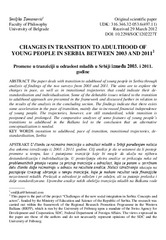Приказ основних података о документу
Promene u tranziciji u odraslost mladih u Srbiji između 2003. i 2011. godine
Changes in transition to adulthood of young people in Serbia between 2003 and 2011
| dc.creator | Tomanović, Smiljka | |
| dc.date.accessioned | 2021-10-12T11:36:44Z | |
| dc.date.available | 2021-10-12T11:36:44Z | |
| dc.date.issued | 2012 | |
| dc.identifier.issn | 0038-0318 | |
| dc.identifier.uri | http://reff.f.bg.ac.rs/handle/123456789/1496 | |
| dc.description.abstract | U članku se razmatra tranzicija u odraslost mladih u Srbiji poređenjem nalaza dva anketna istraživanja iz 2003. i 2011. godine. Cilj analize je da se ustanovi da li postoje promene u tempu, kao i putanjama tranzicije koje bi mogle da ukažu na njihovu destandardizaciju i individualizaciju. U postavljanju okvira analize se prikazuju neka od problematičnih pitanja vezana za pristup tranzicije u odraslost, koja se potom u završnom delu članka dalje razmatraju u odnosu na rezultate analize. Nalazi istraživanja ukazuju na postojanje izvesnog ubrzanja u tempu tranzicije, koje je mahom rezultat veće finansijske nezavisnosti mladih. Prelazak u odraslost je odložen i pr odužen, ali su putanje prelaska i dalje standardizovane. Uporedne analize nekih obeležja tranzicija mladih na Balkanu vode zaključku da je potrebna alternativna konceptualizacija koja bi odrazila društveno-kulturne specifičnosti regiona. | sr |
| dc.description.abstract | The paper deals with transition to adulthood of young people in Serbia through analysis of findings of the two surveys from 2003 and 2011. The aims are to explore the changes in pace, as well as in transitional trajectories that could indicate their destandardisation and individualisation. Some of the debatable issues related to the transition to adulthood approach are presented in the framework and discussed further in relation to the results of the analysis in the concluding section. The findings indicate that there exists some acceleration in the pace of transition, mainly due to increased financial independence of young people. The trajectories, however, are still standardised, while transition is postponed and prolonged. The comparative analyses of some features of young people’s transitions to adulthood in the Balkans led to the conclusion that an alternative conceptualization is needed. | en |
| dc.publisher | Sociološko udruženje Srbije i Crne Gore, Beograd i Univerzitet u Beogradu - Filozofski fakultet - Institut za sociološka istraživanja, Beograd | |
| dc.relation | info:eu-repo/grantAgreement/MESTD/Basic Research (BR or ON)/179035/RS// | |
| dc.rights | openAccess | |
| dc.rights.uri | https://creativecommons.org/licenses/by-nc/4.0/ | |
| dc.source | Sociologija | |
| dc.subject | tranzicija u odraslost | sr |
| dc.subject | tempo tranzicije | sr |
| dc.subject | Srbija | sr |
| dc.subject | putanje tranzicije | sr |
| dc.subject | destandardizacija | sr |
| dc.subject | transitional trajectories | en |
| dc.subject | transition to adulthood | en |
| dc.subject | Serbia | en |
| dc.subject | pace of transition | en |
| dc.subject | destandardisation | en |
| dc.title | Promene u tranziciji u odraslost mladih u Srbiji između 2003. i 2011. godine | sr |
| dc.title | Changes in transition to adulthood of young people in Serbia between 2003 and 2011 | en |
| dc.type | article | |
| dc.rights.license | BY-NC | |
| dc.citation.epage | 243 | |
| dc.citation.issue | 2 | |
| dc.citation.other | 54(2): 227-243 | |
| dc.citation.rank | M24 | |
| dc.citation.spage | 227 | |
| dc.citation.volume | 54 | |
| dc.identifier.doi | 10.2298/SOC1202227T | |
| dc.identifier.fulltext | http://reff.f.bg.ac.rs/bitstream/id/434/1493.pdf | |
| dc.identifier.scopus | 2-s2.0-84862272636 | |
| dc.type.version | publishedVersion |

